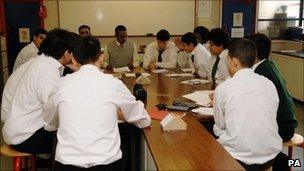NI education status 'an enduring myth' says Sir Robert Salisbury
- Published

The perception that NI schools are the best is a myth says Sir Robert Salisbury
The view that Northern Ireland has the best education system in Europe is an "enduring myth", an expert has said.
Professor Sir Robert Salisbury, who is leading a numeracy and literacy inquiry at NI schools, said failing teachers needed to be challenged or sacked.
He pointed to the criticism of standards in recent reports from the chief inspector of education.
These found that one in four primary school heads and one in three post-primary heads were not good enough.
Talking about the quality of education in Northern Ireland, Sir Robert said: "There is a marked difference between highest and lowest performing students and a significant long tail of under achievement."
He said some small schools did not have the sort of specialism in the teaching force that was needed.
Sir Robert said in terms of reading, Northern Ireland was 19th in the list of top 30 countries, behind England, Scotland and the Republic of Ireland.
In maths, Northern Ireland was performing even more poorly, coming 27th out of the top 30, again, behind England, Scotland and the Republic of Ireland.
"We have some excellent teachers," he pointed out. "I don't think their expertise is being used enough. There is no dissemination of their good practice to other schools or not nearly enough of that."
Speaking about teachers under-performing, he added: "If you have some teachers not making the grade, they need support, they need additional training or indeed, in this world, they maybe need sacking."
Sir Robert said that the chief inspector's report contained "the harsh truth" and that the status quo was not sustainable.
On Monday, Education Minister John O'Dowd told the assembly he had ordered an audit of every school, starting with post primaries.
He said there were too many empty places in schools, now up to 85,000 equating to more than 150 empty schools.
He said "difficult, sometimes unpopular, but necessary decisions" would have to be taken to reduce that number.
The minister said he was determined to improve the quality of education even if it meant having to close schools.
However Mervyn Storey, chairman of the education committee, said he feared the controlled sector could be unequally penalised.
"It is very clear that as a result, there will be a loss of jobs and a loss of schools," he said.
"The issue for me and for people with an interest in education is where are these schools going to be.
"I'm very focused and determined that there will be an equality of distribution, rather than what has seemed to be the case to date with one sector taking a disproportionate hit over another."
By 2015, schools will have to eventually offer 24 subjects in fifth form and 27 in sixth form.
The department of education lost £700m from its budget for the next four years after cuts by Westminster to the block grant.
- Published27 September 2011
- Published26 September 2011
- Published26 September 2011
- Published26 September 2011
- Published21 September 2011